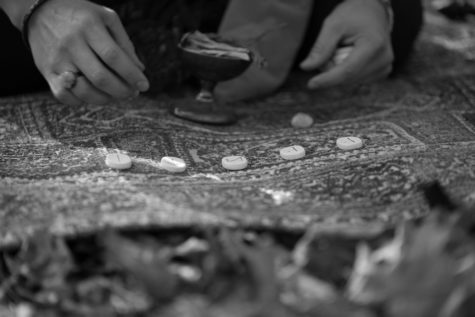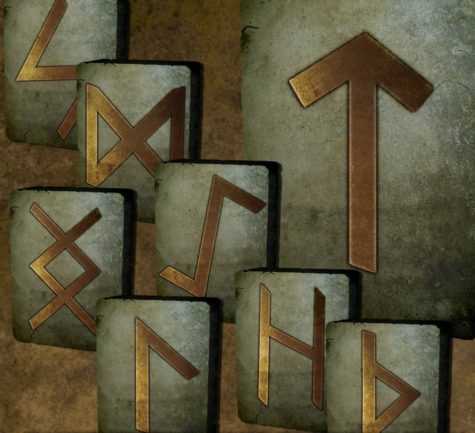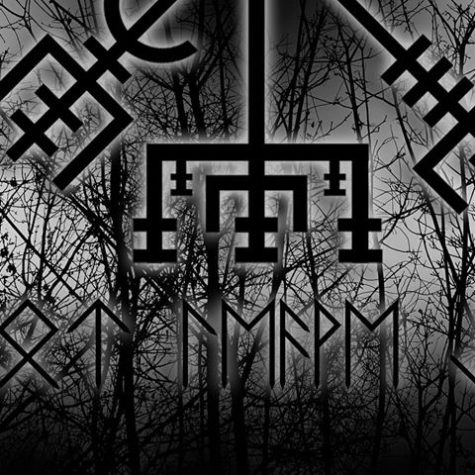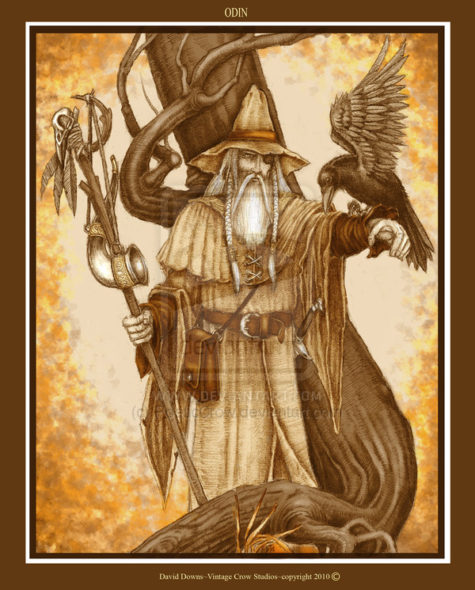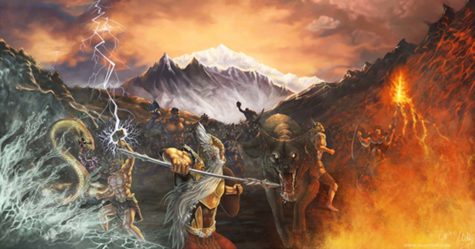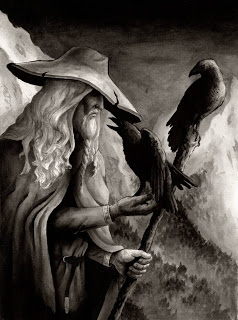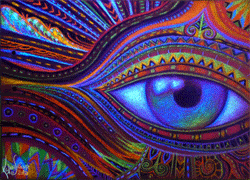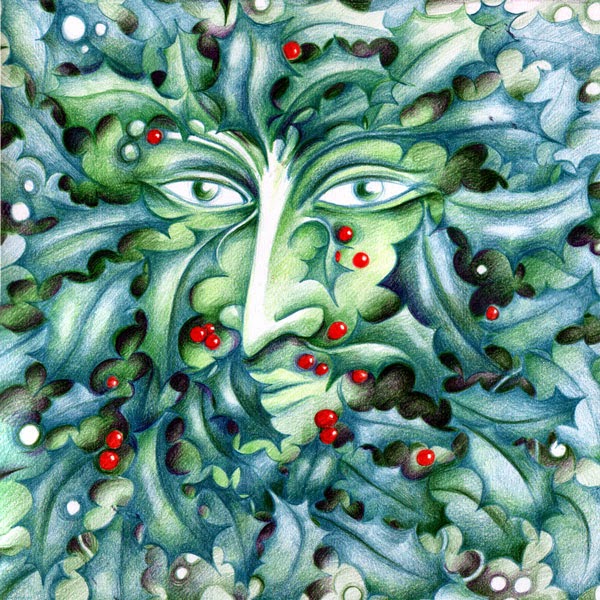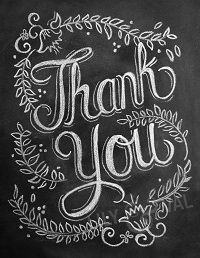Viking
The Icelandic Rune Poem
Rune poems were created as mnemonic aids for remembering the rune symbols, their names, meanings and properties. This one has been rendered in modern English.
- Fé – Wealth
Source of discord among kinsmen
and fire of the sea
and path of the serpent.
- Úr – Shower
Lamentation of the clouds
and ruin of the hay-harvest
and abomination of the shepherd.
- Thurs – Giant
Torture of women
and cliff-dweller
and husband of a giantess.
- Óss – God
Aged Gautr
and prince of Ásgardr
and lord of Vallhalla.
- Reid – Riding
Joy of the horsemen
and speedy journey
and toil of the steed.
- Kaun – Ulcer
Disease fatal to children
and painful spot
and abode of mortification.
- Hagall – Hail
Cold grain
and shower of sleet
and sickness of serpents.
- Naud – Constraint
Grief of the bond-maid
and state of oppression
and toilsome work.
- Iss – Ice
Bark of rivers
and roof of the wave
and destruction of the doomed.
- Ár – Plenty
Boon to men
and good summer
and thriving crops.
- Sól – Sun
Shield of the clouds
and shining ray
and destroyer of ice.
- Tyr – Tyr (The God)
God with one hand
and leavings of the wolf
and prince of temples.
- Bjarken – Birch
Leafy twig
and little tree
and fresh young shrub.
- Madr – Man
Delight of man
and augmentation of the earth
and adorner of ships.
- Lögr – Water
Eddying stream
and broad geyser
and land of the fish.
- Yr – Yew
Bent bow
and brittle iron
and giant of the arrow.
From: Runic and Heroic Poems by Bruce Dickins
The Old Norse Rune Poem
Rune poems were created as mnemonic aids for remembering the rune symbols, their names, meanings and properties. Here is a very old Runic poem:
- Fe
Wealth is a source of discord among kinsmen;
the wolf lives in the forest.
- Ur
Dross comes from bad iron;
the reindeer often races over the frozen snow.
- Thurs
Giant causes anguish to women;
misfortune makes few men cheerful.
- As
Estuary is the way of most journeys;
but a scabbard is of swords.
- Reidh
Riding is said to be the worst thing for horses;
Reginn forged the finest sword.
- Kaun
Ulcer is fatal to children;
death makes a corpse pale.
- Hagall
Hail is the coldest of grain;
Christ created the world of old.
- Naudhr
Constraint gives scant choice;
a naked man is chilled by the frost.
- Isa
Ice we call the broad bridge;
the blind man must be led.
- Ar
Plenty is a boon to men;
I say that Frodi was generous.
- Sol
Sun is the light of the world;
I bow to the divine decree.
- Tyr
Tyr is a one-handed god;
often has the smith to blow.
- Bjarkan
Birch has the greenest leaves of any shrub;
Loki was fortunate in his deceit.
- Madhr
Man is an augmentation of the dust;
great is the claw of the hawk.
- Logr
A waterfall is a River which falls from a mountain-side;
but ornaments are of gold.
- Yr
Yew is the greenest of trees in winter;
it is wont to crackle when it burns.
From: Runic and Heroic Poems by Bruce Dickins
The Runes of Power
From the “Poetic” Edda, one of the primary written sources for Norse mythology, here is one translation of the Havamàl which speaks about the runes and runic power.
Do you know, how to carve them?
Do you know, how to read them?
Do you know, how to color them?
Do you know, how to understand them?
Do you know, how to pray?
Do you know, how to sacrifice?
Do you know, how to send?
Do you know, how to discard?
Better not to pray at all,
than to sacrifice too much.
A gift requires a gift in return.
Better not to send at all,
than to counteract too much.
Thus carved Thund before time,
when he rose, when he returned.
The Havamàl
The Havamàl is part of the Elder or “Poetic” Edda, which is one of the primary written sources for Norse mythology. This excerpt from the W. H. Auden and P. B. Taylor translation of the Havamàl contains Odin’s telling of how he obtained the runes and runic power.
Wounded I hung on a wind-swept gallows
For nine long nights,
Pierced by a spear, pledged to Odin,
Offered, myself to myself
The wisest know not from whence spring
The roots of that ancient rood.
They gave me no bread,
They gave me no mead,
I looked down;
With a loud cry
I took up runes;
From that tree I fell.
Nine lays of power
I learned from the famous Bolthor, Bestla’ s father:
He poured me a draught of precious mead,
Mixed with magic Odrerir.
Waxed and throve well;
Word from word gave words to me,
Deed from deed gave deeds to me.
Runes you will find, and readable staves,
Very strong staves,
Very stout staves,
Staves that Bolthor stained,
Made by mighty powers,
Graven by the prophetic God.
For the Gods by Odin, for the Elves by Dain,
By Dvalin, too, for the Dwarves,
By Asvid for the hateful Giants,
And some I carved myself:
Thund, before man was made, scratched them,
Who rose first, fell thereafter.
Know how to cut them,
know how to read them,
Know how to stain them,
know how to prove them,
Know how to evoke them,
know how to score them,
Know how to send them,
know how to send them.
Better not to ask than to over-pledge
As a gift that demands a gift.
Better not to send
Than to slay too many.
Norse Mythology ~ Simplified
Creation
In the beginning was Muspell, the realm of fire. It is a place of dreadful light and heat. Only its natives, the Fire Giants, can tolerate its flames. Surt, a Fire Giant, guards Muspell’s border, armed with a flaming sword. At the end of the era, at Ragnarok, Surt and his companions will destroy all the Gods and and their world with fire.
Outside of Muspell lies the void called Ginnungagap, and north of Ginnungagap is Niflheim, the world of awesome dark and cold. In this world are eleven rivers flowing from a great well. The rivers are frozen and occupy Ginnungagap. When the wind, rain, ice, and cold meet the heat and fire of Muspell in the center of Ginnungagap, a place of light, air, and warmth is born.
Where fire and ice first met, thawing drops appeared. Beneath the melting ice lay a Frost Giant named Ymir. Ymir slept, falling into a sweat. Under his left arm there grew a couple, male and female Giants. One of his legs begot a son with the other.
The melting frost became a cow called Audhumla from whose udders ran four rivers of milk that fed Ymir.
After one day of licking salty ice blocks, she freed a man’s hair from the ice. After two days, his head appeared. On the third day the whole man was released from the ice. The man’s name was Buri. Buri had a son named Bor. Bor married Bestla, the daughter of a Giant, with whom he had three sons. Odin was the first, Vili the second, and Vé the third. Odin, in association with his brothers, is the ruler of heaven and earth. He is the greatest and most famous of all Gods.
Odin and his brothers killed the Giant Ymir. They carried Ymir to the middle of Ginnungagap and created the world, called Midgard, from his body. Ymir’s blood became the sea and and lakes. His skull became the cover of the sky which was set over the earth. Ymir’s brains were tossed into the air, and became clouds. Then sparks and burning embers from Muspell were placed in the middle of Ginnungagap to give light to Midgard. They named the stars and set their paths. Ymir’s skeleton became the mountains of Midgard. His teeth and jaws became rocks and pebbles. His flesh was ground into dirt in the great mill Grottekvarnen. Ymir’s hair became trees. Maggots appeared in Ymir’s flesh became Dwarves, who had human understanding and the appearance of men, but lived in the earth. Under each corner of the sky the suns of Buri put a Dwarf. The four Dwarves are called Austri (East), Vestri (West), Nordri (North), and Sudri (South).
Midgard
Midgard was surrounded by an enormous ocean. Odin, Vili and Vé gave lands along the coasts to the friendlier Giants, the Etin, for their settlements. From two trees they created a human man and woman. Odin gave the man and the woman spirit and life. Vili gave them understanding and the power of movement. Vé gave them clothing and names. The man was named Ask [Ash] and the woman Embla [Elm]. Ask and Embla are the ancestors of all humans in Midgard.
Asgard
Next they built Åsgard, the home of the Gods. In a hall named Hlidskjálf, Odin sits on a high seat from which he can look out over the whole world. Odin married Frigga, the daughter of the Giant Fjörgvin.
Yggdrasil
Yggdrasil, the World-Tree, the tree of fate, arises in the center of the Midgard. Its branches reach up over Asgard. The entire universe is dependent on the World-Tree. The tree has three three roots. One reaches into the underworld Hel, another to the world of the Frost-Giants, and the last one to the world of human beings. Beneath the tree is the Urda well, guarded by the Norns, the three Goddesses of Fate. Two other wells also feed Yggdrasil. One is called Hvergelmer, and the other is Mimer’s well. The dragon Nidhog lies in Hvergelmer and gnaws on the roots of the tree. Mimer’s well is the well of wisdom, guarded by the wisest of all beings, Mimer. Odin once gave his right eye for a drink of the water from this well.
Bifrost
The Gods built a bridge called Bifröst from Asgard (heaven) to Midgard (earth). They ride daily over the great rainbow bridge. Bifröst is guarded by the God Heimdall. Heimdall sleeps lighter than a bird, sees one hundred travel-days in each direction, and has such sharp ears that he can hear the grass and the wool grow. But as strong as Bifröst is, it will collapse when the when the Frost Giants ride out over it at Ragnarok. There is nothing that can be relied on when the sons of Muspell are on the warpath.
Gods & Goddeses
The Norse deities are divided into two major groups, the Aesir and the Vanir. The Vanir, the “Earth Gods”, symbolize riches, fertility, and fecundity. They are associated with the earth and the sea. The most important Gods of the Vanir are Njord, Freyr, Aegir and Freya.
The Aesir, the “Sky Gods”, symbolize power, wisdom, and war. They are long lived, but not immortal. Odin is the leader of the Gods, with magical skills. Thor, with his magic hammer, is the God of Thunder who presides over working men. Loki is a Giant who is an Aesir by adoption. He and Odin made a vow of friendship and became blood-brothers. Loki is a trickster, a shapeshifter, and a troublemaker.
In the distant past a fierce war was fought between the Aesir and the Vanir. The conflict between the Gods began when Odin and Thor refused to recognize the full status of Godhood to the Vanir. The Vanir sent a beautiful woman, Gullveig (gold-drink), to the Aesir, who tried to destroy her. She came back to life three times, and led to their corruption. War then broke out. After both sides were exhausted, each side exchanged members of its group with the other; the Vanir sent Njord and his son and daughter Freyr and Freya, the Aesir sent Mimir and Hoenir. The truce was celebrated by a meeting at which all the Gods spit into a bowl, creating a Giant called Kvasir, who is the sign of peace and harmony among the deities. Kvasir was later sacrificed and from his blood became a potent drink which inebriates deities and gives inspiration to poets.
Balder, one of the sons of Odin, appeared as the essence of intelligence, piety, and wisdom. Both Gods and men came to him to settle legal disputes, and his judgments were reconciling and fair. Balder had a dream in which his life was threatened. Upon reporting this dream to his mother, Frigga, she exacted an oath from fire, water, metals, earth, stones, and all birds and animals. They swore they would not harm Balder. Because of his immunity, the Aesir used Balder as a target in games, throwing darts and stones at him. When Loki saw this, he disguised himself as a woman and asked Frigga why Balder suffered no harm. Frigga told him of the oath. Loki tricked her into telling him that mistletoe was the only being that did not agree to the oath. Loki immediately took mistletoe and created arrows. He took the arrows to the Blind God Hoder, brother of Balder, and volunteered to direct his aim so that he would participate in the game. When the mistletoe struck Balder, Balder fell dead.
Because Balder was not a warrior and did not die in battle, he did not go to Valhalla, the hall of slain heroes, but into the domain of Hel, Keeper of the Dead. When Odin begged his release, Hel (Loki’s daughter) responded that if everything in the world both dead and alive wept for Balder, then he could return to the Aesir. If not, he would remain with Hel. The Aesir sent messengers throughout the world asking all to weep for Balder. All responded except a Giantess, Thokk (Loki in disguise), whose refusal to weep forced Balder to remain in Hel’s domain. The Aesir succeeded in capturing Loki. To punish him for his many crimes, they chained him beneath a serpent, which dripped venom onto him, causing terrible pain.
Ragnarok
The Ragnarok, or end of the world, has been prophesied. When Mirmir no longer guards his well, Yggdrasil’s root will begin to rot. The Nidhog dragon will finally succeed in knawing through the root that ends at Hvergelmer well. The Norns will be alarmed at the pollution of the Urdh well and the yellowing of the leaves of the world tree. Odin’s sacrificed eye lies in Mirmir’s well and sees what is to come. He knows that nothing can stop Fibulwinter, three years with endless winter, which will be followed by Ragnarok.
The days will grow colder until even Urda well freezes solid. Storm and sleet will pound the World-Tree. One of Yggdrasil’s branches will break and fall, striking Jormungand, the world serpent, which immediately will let go of its tail. The Hel ship Naglfar will become visible in the mist. The wolves Skoll and Manegarm will get closer and closer to Sun and Moon, which they have chased for eons. Fenrir wolf and and the Hel-wolf Garm will break their chains. Giants will release Loki from his fetters on the mountain. Nidhoggr will leave the roots of Yggdrasil and head toward Asgard. Behind him will march all the Giants. Heimdall will see all this, and will take up the Gjallarhorn to blow the warning.
Loki will lead monsters and Giants to attack the Gods in the great battle of Ragnarok on Vigrid plain. The leader of the Fire Giants, Surt, will attack Freyr, who will be armed only with a deer’s antler. Freyr will stick his deer horn through Surt’s eye, but then Surt will kill him with his flaming sword. Thor’s son Magni will send a killing arrow toward Nidhoggr’s head. Side by side, Odin and Thor will fight Fenrir and Jormungand. Odin will put his spear, Gungnir, in Fenrir’s chest, but the wolf will crush Odin to the ground. Thor will kill Jormungand with his hammer, Mjollnir, but then will take nine steps backwards and fall down, poisoned by the serpent’s venom. Tyr will kill the wolf dog Garm. Vidar will take revenge for Odin. The enemies Loki and Heimdall will their spears at each other at the same time and both will die. Modi will be surrounded by Giants, but Magni and Vidar will rescue him.
The winds will increase and blow Yggdrasil from every direction until the great World-Tree falls. The Dark Elves forge will tip and the World-Tree will burn. The Bifrost Rainbow Bridge will collapse and one by one each of the Worlds will fall. The remaining Aesir will escape in Freyr’s ship, Skidbladnir. It will be almost taken by the Hel-ship Naglfar. Midgard will then be destroyed by fire, and will sink back into the sea.
This final destruction will be followed by a rebirth, the Earth reemerging from the sea. Seven sons of the dead Aesir will return to Asgard and rule the universe.
From: Sunnyway
The Doom of Odin
“I find no comfort in the shade
Under the branch of the Great Ash.
I remember the mist
of our ancient past.
As I speak to you in the present,
My ancient eyes
see the terrible future.
“Do you not see what I see?
Do you not hear
death approaching?
“The mournful cry of Giallr-horn
shall shatter the peace
And shake the foundation of heaven.
“Raise up your banner
And gather your noble company
from your great hall,
Father of the Slains.
For you shall go to your destiny.
“No knowledge can save you,
And no magic will save you.
For you will end up in Fenrir’s belly,
While heaven and earth will burn
in Surt’s unholy fire.”
— Doom of Odin,
from the Book of Heroes
James Cheney: Invocation To The Dark Mother
Daniel: Prayer Before The Final Battle
blessed obyno: Queen of Ghosts
blessed obyno: Queen of Ghosts
Caerlion Arthur: The Great, Bloody and Bruised Veil of the World
